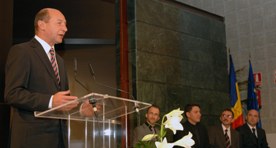Leaders of the Seventh-day Adventist world church have voted during Annual Council in Manila (Philippines) to ask the next General Conference session in 2010 for broad authority to change church departmental structures and hiring, as they pursue greater efficiency than the current process, leaders say.
"It is important for the church to be able to move with flexibility and dexterity," Adventist Church president Jan Paulsen said after the ballot. The decision, he said, "is a signal of the fact that we want to retain the flexibility to function as a dynamic community while protecting our values."
Paulsen's comments came after the Annual Council, the world church's yearly business session, voted to ask the 2010 world church session in Atlanta, Georgia (USA), to allow the church's Executive Committee to make changes in the structure of headquarters departments without first getting a quinquennial business meeting to approve the moves. The session will continue to have final authority to review or reverse adjustments made by the Executive Committee during the quinquennium. Also, the election of associate departmental directors or associate secretaries of associations will shift from a session to the first Annual Council following a session, if the proposal is approved in Atlanta.
The two administrative proposals were the result of the three-year-old Commission on Ministries, Structures and Services, which held a series of global meetings in which the church's operations were evaluated. The report came to the floor of Annual Council on the day that General Conference Treasurer Robert E. Lemon reported that the 16-million member protestant Seventh-day Adventist Church was dealing with the uncertainties of the current world financial market. Lemon, Paulsen and other leaders emphasized the need for the church to be able to respond to such conditions more quickly.
A key rationale for allowing the Executive Committee to make departmental changes between sessions is this need for flexibility in changing times. The decision to ask for a change in the way associate directors and associate secretaries are elected is designed to relieve pressure on Session nominating committees and newly elected departmental directors, some of whom have had to choose their associates with very little time.
The church did "not give up anything that is valuable" in taking the action, Paulsen said, but rather is enhancing the ability of church leaders to manage in a more dynamic fashion.
He noted that while "we have done things in a given way for so many, many years, perhaps there is another way."
The potential for "another way" may also extend to the operation of two church-owned publishing houses in North America, the Review & Herald Publishing Association (RHPA) in Hagerstown, Maryland, and the Pacific Press Publishing Association (PPPA) in Nampa, Idaho. Both presses have historic roots in Adventism: Review & Herald was the church's first publishing house, and for many years operated in Battle Creek, Michigan, and Takoma Park, Maryland. Started in Mountain View, California, PPPA is another long-time publishing house for the church. Both houses have been central to producing literature and magazines for the world church, as well as North America. Review & Herald prints Adventist Review and many editions of Adventist World. Pacific Press is lead printer of the Adult Bible Study Guide, the church's Sabbath School quarterly.
However, Paulsen said on October 13 that "publishing is also a business," and "from time to time we have to ponder the question if we have the best arrangement of publishing institutions."
Paulsen asked, "Have we put together the best publishing structure to serve the church?" To find out whether that's the case, Paulsen proposed -- and delegates accepted -- the creation of a commission that would have "the task of assessing publishing realities." With members principally drawn from North America, the goal is to have the commission's report ready for the 2009 Spring Meeting at Oakwood University in Huntsville, Alabama.
Though the motion passed easily, Robert Smith, RHPA president, noted that world church headquarters has studied the North American publishing system previously. He urged that the new commission would not "study us to death and make the cure worse than the disease."
Smith asserted that RHPA made a profit of US$100,000 in the year ending September 30. He said that if world church headquarters "would give us all the work that is justifiably ours," the press' business would be stable.
Pacific Press president Dale Galusha told Adventist Review: "We welcome opportunities such as this to explore better ways to even more effectively strengthen the church, promote its mission and deliver faith-strengthening and spiritually inspiring books and materials to Adventist church members." [Editor: Mark Kellner for Adventist Review/ANN and APD]

